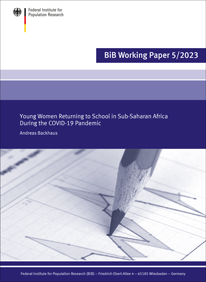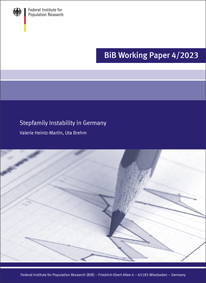BiB.Working Paper
BiB.Working Paper make results and findings available to the scientific public as soon as possible. The series contains articles from the Federal Institute for Population Research (BiB) and papers which have been issued in cooperation with other research institutes as well as external researchers.
The series is subject to a limited internal review process. Thus, the contents do not necessarily represent the position of the BiB, but rather the opinions of the authors. The working papers are written in English or German and are published only electronically at irregular intervals.
Published by: Federal Institute for Population Research (BiB)
Editor depending on topic: Prof. Dr. Martin Bujard, Prof. Dr. Sebastian Klüsener, Prof. Dr. Katharina Spieß
ISSN: 2196-9574
Latest Issues
Search results 21 to 30 from a total of 62
Heintz-Martin, Valerie; Brehm, Uta
Separations exert a detrimental impact on different areas of life in both adults and children. Having already experienced family instability, stepfamily members are at risk of experiencing even multiple family separations across the life course. To better understand stepfamily (in)stability in Europe, we study stability risks and facilitators between stepfamilies in Germany. more: Stepfamily Instability in Germany …
Hudde, Ansgar; Hank, Karsten; Jacob, Marita
We analyze data from the UK Household Longitudinal Study, including a pre-pandemic baseline and seven survey waves between May 2020 and September 2021. Fixed effects panel regression models are run over more than 11,000 individuals, distinguishing among women and men with young children (< 5 years), older children (5-15 years), or no children in the household. more: Children and Dynamics of Life Satisfaction in Times of COVID-19 …
Büchau, Silke; Philipp, Marie-Fleur; Schober, Pia S.; Spiess, C. Katharina
This study conceptualises and empirically investigates how priming respondents with brief media report-like information on existing day care policy entitlements and the economic consequences of maternal employment interruptions may change personal normative beliefs about parental work-care arrangements. Furthermore, we analyse whether these effects differ between groups of respondents assumed to vary in their degree of affectedness by the information as well as previous knowledge. more: Day care availability and awareness of gendered economic risks: How they shape work and care norms …
Kreyenfeld, Michaela; Konietzka, Dirk; Lambert, Philippe; Ramos, Vincent Jerald
This study uses a gender and class perspective to study rates of progression to the second birth in Germany. Using data from the German Socio-Economic Panel for the period 1990-2020, we distinguish individuals by whether they are in (a) higher managerial/professional, (b) lower managerial/ professional, (c) skilled manual/higher routine nonmanual, or (d) the nonskilled manual/lower routine nonmanual classes. Our analysis reveals strongly elevated second birth rates among men and women in the managerial classes. We also show that upward mobility after the first birth is associated with higher second birth rates, particularly among men. more: Second Birth Fertility in Germany: Social Class, Gender, and the Role of Economic Uncertainty …
Huebener, Mathias; Pape, Astrid; Danzer, Natalia; Spieß, C. Katharina; Siegel, Nico A.; Wagner, Gert G.
This paper analyses to what extent the pandemic changed gender role attitudes toward maternal employment. Using German data from 2008 through spring 2022, we use before-and-after comparisons and individual fixed effects models to trace changes in gender role attitudes throughout the first two years of the pandemic. more: Cracking under Pressure? Gender Role Attitudes toward Maternal Employment during COVID-19 …










